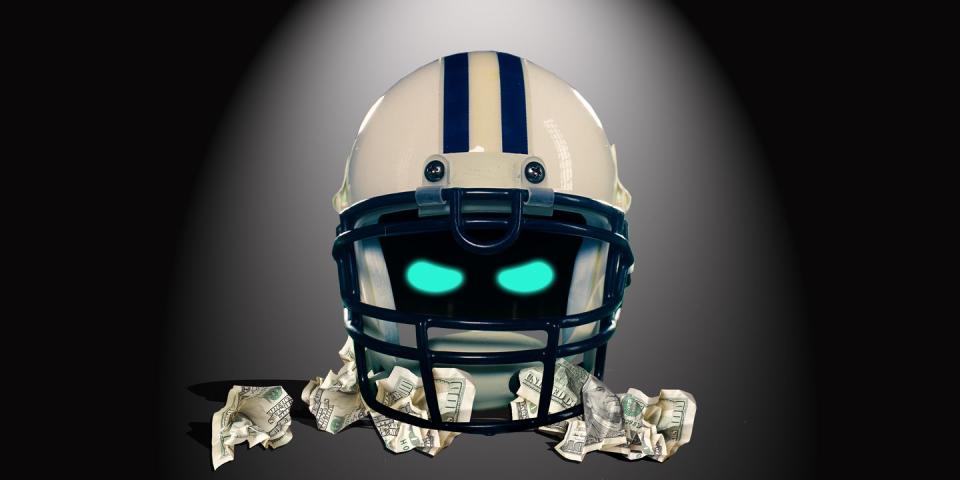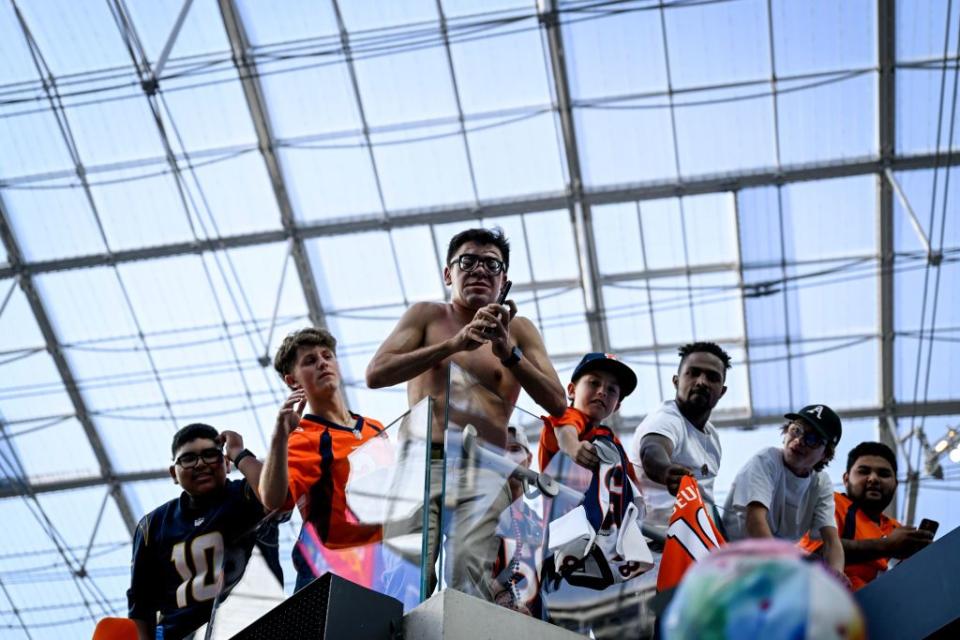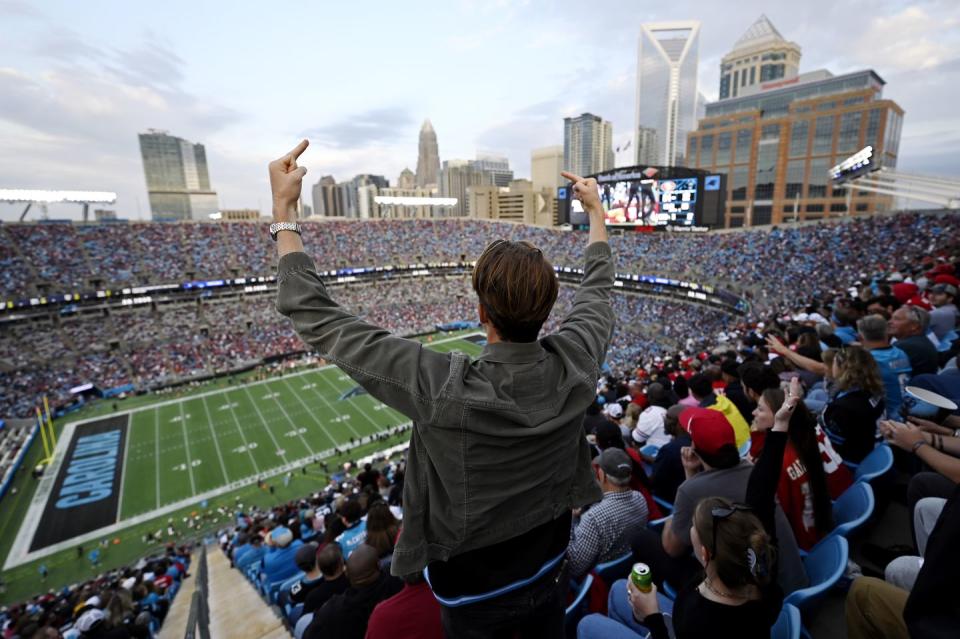The Fantasy Football Kingpin

The names of people in this story have been changed for privacy.
I didn't expect the first text from Sam. It came on a wholly unremarkable night. Unprompted. Sam had a problem. He needed advice, and didn't really have anyone else to turn to. It wasn't exactly something Sam could broach with friends, parents, colleagues, or peers. So he went to me, a guy he lacked personal history with. That seemed to be the point.
Sam's problem was cocaine.
Sam is an undergrad at a college in Minnesota, couldn't tell you where. He’s somewhere around 22 years old. He’s hardly a demographic outlier–arguably normal, actually–in that Sam likes to party, and he likes to do it often. As his messages popped in my notifications, one after another, he stressed that cocaine wasn't a problem problem. His weekends indulging in the drug hadn’t evolved into a daily habit. (Yet.) He hadn’t gone so far to pawn his possessions, like his Macbook, or his neighbor’s lawnmower. (... yet.) For Sam, using cocaine was just a bit of fun with friends. Cocaine had a way of elevating him. Confidence in public and all that.
Inevitably, you guessed it, cocaine became a problem problem. Started messing with Sam's schoolwork. Mental health, too. Then came the burden on his friends, and, predictably, his finances. He’d only just begun to learn his cocaine habit wasn’t cheap.
I told Sam I’d be there if he needed me. Though I wasn’t sure how much help I could be. I cut it off there, intentionally.
I’m not Sam’s sponsor. I’m not his counselor, nor anyone else’s. I’m not a mental health professional, although attention to my own mental health couldn’t hurt. I’ve never claimed qualification in a mental health or substance abuse field of any kind, anywhere.
I’m a fantasy football commissioner.
I run seventeen leagues, in fact. I fill them with players, collect dues, allocate it all, repeat. Effectively, it’s the housekeeping of our hobby, in which we draft NFL players and pit them against each other, week to week.
Sam’s played in one of the leagues I've run for the past couple years.
There’s something about the nexus of football, gambling, and statistics that just gets me. When that trifecta of pleasure meets, I feel an internal click—ping!—and before I knew it was missing, a missing piece of my mental puzzle emerges from underneath the sofa. Fantasy football gets me, not in that it consumes my attention—though my partner, Cynthia, would beg to differ—but in a way that feels symbiotic. Plus, it fills the emotional voids created by my athletic shortcomings.
Fantasy football is an escape—a mental trapdoor behind my daily grind as a freelance writer and reporter. I cover climate change for a living, which flings me into dystopian situations more often than I'd prefer. It’s a line of work that tends to make you feel small. But managing my fantasy teams and the players I start or sit? Well, that's in my control.
I stumbled into this hobby about seven years ago. I was good at it, too, making the playoffs in my first year, but I wasn’t terribly surprised. I’d always been a football super-fan of some sort. Whereas some fandom starts and ends with a hometown team, mine always extended to the politics and power at play within each respective league. NFL owners with axes to grind against each other? College football conference realignment that’s largely decided by a program’s legacy, TV market size, and size of endowment? Sign me up.
For too long, I felt like an insider living on the outside. Then, I found out I wasn't alone.

By some estimates, there are roughly 400 million American football fans across the globe. A 2020 survey by the consumer data analysis company Statista found that 10 percent of football fans intended to play in a football league that year; half of those who said they would play in a fantasy league intended on playing in multiple leagues. Which means we're working with roughly 40 million fantasy footballers worldwide.
Most of those folks break into the hobby through “redraft” leagues, where every league member drafts an entirely new roster at the beginning of each season. From there, the addiction usually spirals into joining a “dynasty” league, which allows managers to return their entire roster from the previous season while adding to it in an annual rookies-only draft. (Translated: the season never ends.) My preferred format is the most niche of all: “Campus to Canton” leagues, where each player runs two rosters (NFL and college football), which that compete for their own respective championships. Each offseason, your college football players graduate to your professional roster. Yeah. It's intense.
Naturally, it was the Internet that brought us psychos together. Facebook, Twitter, Discord, you name it—but the ecosystem is damn near inescapable once you’re in it. Over the years, my leagues have seen lawyers, Brink’s truck drivers, K-8 educators, finance bros, graphic designers, and more, emerging as a rag-tag but cohesive unit. What begins as a place to talk football solidifies into something deeper. We become close friends through only our screen names on the fantasy football apps we use, like FantasyFootballGuru, berdman, TClem1990, and naturalslugger.
Our families and partners inevitably come up, sure. You'll catch a glimpse of someone's non-fantasy existence through the group chat in the apps we use. (We're everywhere: ESPN, Sleeper, Yahoo.) Stay in one of these leagues long enough, and you'll be sharing condolences as your biggest rival helps his wife bury her mother, or chiming in a “get well soon” to a guy down with COVID. Inadvertently, we often find ourselves leaning less fantasy football league, and more emotional support group.
Then there’s the money.
Beyond the glory that comes with winning, part of the goal of most leagues is winning a cash prize at the end of the season. Every preseason, each league member pays an agreed-upon amount into a website, usually $50 to $100 apiece, which holds the cash for us until the season is over. Getting people to actually fork out money is a bit like cat-herding for commissioners. Weeks pass, then months. The excuses pile up. Some are good. Others? Terrible.
Last summer, just prior to the NFL season’s kickoff, a league-mate told me he could pay as soon as he finalized his divorce later that week. He kept his word and paid every penny. But the next year, it was the same excuse. I was about to call bullshit. Turns out, it was a second divorce.
Seriously. I’ve heard it all.
One person needed a few weeks while he sat out a ticket in county jail.
Another just had his seventh kid.
One flat-out didn't have the money. Fred. But he had a good reason.

One day, Fred told the league why he couldn't pay up. That season, he decided to triple the number of his fantasy leagues he played in from 40 the previous year—to be clear, that’s too many by even our standards—to 120. At the beginning, Fred had the money in hand to pull it off. Predictably, he lost a staggering amount of money. Thousands of dollars, actually. I felt a ping of sympathy for the guy as he shared his story with the league.
Oh, but there's more. The money wasn’t necessarily his to lose.
Apparently, Fred and his fiancée worked for years to set aside a nest egg of savings. Whatever the amount was, it was supposed to pay for their wedding next year. Fred blew all of it.
The group chat went quiet for a minute.
I wondered if anyone else was thinking the same things as me: How do we respond? Do we laugh? Do we send him the number for a gambling addiction hotline? Do we ignore it?!
“Bro, that’s fuckin’ insane,” another player in the league, Tony, texted me.
Luckily, I know a divorce lawyer in another league if Fred ever needs one.
Listen, I’m the first to admit we take our hobby too seriously. It bleeds into my personal life, too. One morning, late last year, the sun was just beginning to trickle in between the curtains. I hardly slept that night. I felt Cynthia stir next to me as she wrestled the dog for the covers. The dog won, as he always does. I rolled over and faced her.
“What’s it like?” I asked.
“What’s what like?” she replied. It was 7 a.m. She was annoyed.
“What’s it like waking up next to a loser?”
“In fantasy football?” Cynthia asked.
She saw the look on my face and rolled back over.
Our fantasy football playoffs had concluded the night before. Didn’t exactly go as I’d hoped—I was one injury away from winning a little over $1,500. Once again, I fooled myself into thinking fantasy football was in my control.
While the season hadn’t worked out for me, for Sam, it did. He won the college side of our league, which alone nabbed him a respectable amount. Later on, he trounced us through the NFL side of the playoffs, too, on his way to a second championship.
I felt played.
It hadn’t occurred to me that cocaine is, in many ways, fantasy football’s version of a performance enhancing drug, or PED—a banned substance that gives professional athletes the hormonal edge to get bigger, faster, and stronger. Only for Sam, he had the mental edge. Our only advantage was when his dealer ran out of supply.
It actually explained a lot: the notifications that he had made a roster move in the middle of the night, the quick, thoughtful responses when I messaged him, frequent trade offers.
I laughed out loud at the thought. Then I did the math on how much Sam had won.
He never thanked us for paying his college tuition that year.
You Might Also Like

